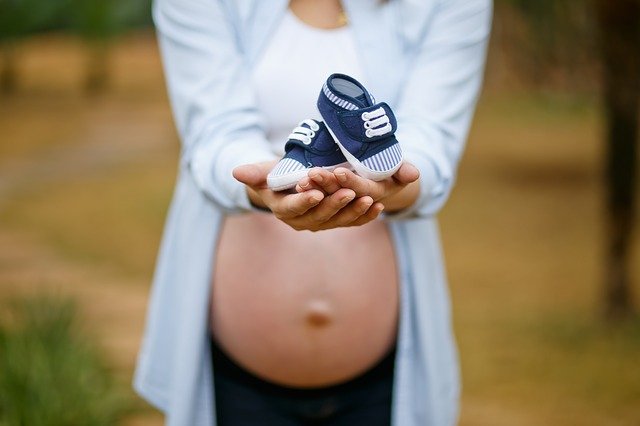
There are so many things to think about when you get pregnant. You’re likely to be concerned about nutrition, exercise, weight gain (too much or not enough?), and preparation for the new arrival.
One thing you may not be prepared for is the way your skin will change. With all the shifting hormones going on, your skin is likely to irritate you at one time or another.
You don’t need something else to worry about, so we wanted to share with you the six most common ways your skin may annoy you during pregnancy, and what you can do about it.
1. Oh I’m so sensitive!
Even if you didn’t have sensitive skin before, you may have sensitive skin now. Are you noticing that it hurts to scrub your face? Do you see more redness and irritation than you used to? That’s a sign that your skin is reacting to what you’re using and what you’re doing, and it’s time to change it up.
Skip the scratchy, nut-filled exfoliating products and go gentle, gentle, gentle. Choose creamy cleansers, fruit-acid-based exfoliators, and a soft loofah instead of a scrubby. In addition to being more comfortable, these steps will help ensure you don’t have any scratches or tears in the skin that could serve as doorways for chemicals and bacteria.
2. Ew, that could hurt the baby.
Fragrances, parabens, sulfates, ureas-these and other harsh chemicals are often found in cosmetic products. You definitely want to reduce your exposure as much as you can during pregnancy to protect your unborn child, who is much more vulnerable to small amounts of chemicals.
Now is the time to go fragrance-free and to choose products with safe ingredients rather than a bunch of synthetic, harsh chemicals. Our CV Skinlabs products are made with careful attention to all the ingredients, to be sure that none are linked with health or allergy issues. Pregnant moms can feel completely safe in using them.
3. It’s like I’m a teenager again!
Pregnancy hormones can encourage more breakouts than you’ve probably experienced since you were in junior high and high school. And of course, you can’t use typical acne products as the ingredients in them (benzoyl peroxide and salicylic acid) may be unsafe for baby, say nothing of acne medications. So what can you do?
Try more natural treatments that include lactic acid or tea tree oil. Try clay or charcoal masks to absorb excess oil. Check your makeup products carefully and get rid of any that contribute to oil or clog pores. Change out your washcloth every day, change your pillowcases often, and try to keep your hands away from your face.
You can also spot-treat acne with a little bit of baking soda and water-apply and allow to dry.
4. It itches!
Your skin may itch during pregnancy because it gets dry. While some people react with more oiliness, others react with more dryness, which can cause itching, irritation, and flaking.
Try using a humidifier in your room, and step up your moisturization. Our Calming Moisture and Body Repair Lotion both have aloe vera and natural oils that penetrate skin to moisturize in the deeper levels. They also both have soothing oat extract, which helps to soothe and calm any itching.
5. What are these dark patches?
Pregnancy hormones can make you more sensitive to the sun. If you’re noticing dark patches or sunspots, that’s why! If you’re not wearing sunscreen every day, it’s time to start. Zinc oxide is the safest option for expectant moms. Avoid chemical sunscreens like oxybenzone and avobenzone as they have been linked in some studies to risks like low birth weight.
In addition to sunscreen, try to avoid direct sun exposure during the peak hours of 10:00 a.m. to 2:00 p.m., and use hats, umbrellas, and shade to protect yourself.
6. My mom had these…
Stretch marks. If your baby grows quickly, you may develop them as the skin works to keep up with your body’s changes. Though moisturizers won’t necessarily prevent them, they can help the skin more easily repair itself, and they may also make skin more comfortable as your belly and breasts are expanding.
Our Body Repair Lotion is perfect for the job. Apply every day to the effected areas, to keep the skin moist and the barrier strong. Then, once baby arrives, you can use gentle exfoliating products to slough of the surface cells and encourage new cells to rise to the surface. Follow with moisturizer, and over time, you can fade the marks. Find more on how to deal with these in our previous post on stretch marks.
7. What’s this rash?
In some cases, you may develop a rash as your pregnancy progresses. If you do, check with your doctor.
“Obstetric cholestasis” is a rare condition that develops in the third trimester, and it can cause itchy hands and feet. It affects the liver and can affect the baby’s health, so it’s important to be sure that’s not what’s happening.
PUPPP is another rare pregnancy rash that can start in the abdomen and spread. It’s harmless to the baby but can be really uncomfortable. To soothe this and other rashes, try ground oatmeal in your bath, and use safe anti-itch creams. Our Body Repair Lotion may help soothe the skin as well.
How did your skin change during pregnancy?

